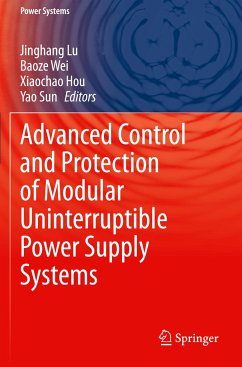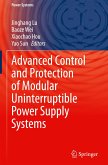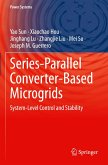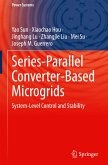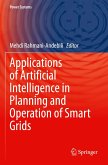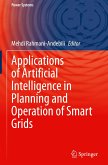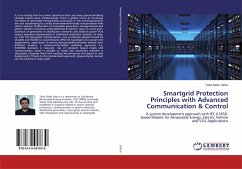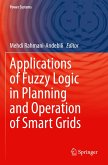Advanced Control and Protection of Modular Uninterruptible Power Supply Systems
Herausgegeben:Lu, Jinghang; Wei, Baoze; Hou, Xiaochao; Sun, Yao
Advanced Control and Protection of Modular Uninterruptible Power Supply Systems
Herausgegeben:Lu, Jinghang; Wei, Baoze; Hou, Xiaochao; Sun, Yao
- Broschiertes Buch
- Merkliste
- Auf die Merkliste
- Bewerten Bewerten
- Teilen
- Produkt teilen
- Produkterinnerung
- Produkterinnerung
This book provides an in-depth introduction to all major control and stability issues related to microgrids. It is the first book to offer a comprehensive look into the methodologies and philosophies behind system modeling, coordinated control, and protection for developing reliable, robust, and efficient operation of modular uninterruptible power supply systems. For each topic, a theoretical introduction and overview are backed by concrete programming examples that enable the reader to thoroughly understand the topic and develop and conduct simulation models.
Andere Kunden interessierten sich auch für
![Advanced Control and Protection of Modular Uninterruptible Power Supply Systems Advanced Control and Protection of Modular Uninterruptible Power Supply Systems]() Advanced Control and Protection of Modular Uninterruptible Power Supply Systems127,99 €
Advanced Control and Protection of Modular Uninterruptible Power Supply Systems127,99 €![Series-Parallel Converter-Based Microgrids Series-Parallel Converter-Based Microgrids]() Yao SunSeries-Parallel Converter-Based Microgrids104,99 €
Yao SunSeries-Parallel Converter-Based Microgrids104,99 €![Series-Parallel Converter-Based Microgrids Series-Parallel Converter-Based Microgrids]() Yao SunSeries-Parallel Converter-Based Microgrids104,99 €
Yao SunSeries-Parallel Converter-Based Microgrids104,99 €![Applications of Artificial Intelligence in Planning and Operation of Smart Grids Applications of Artificial Intelligence in Planning and Operation of Smart Grids]() Applications of Artificial Intelligence in Planning and Operation of Smart Grids97,99 €
Applications of Artificial Intelligence in Planning and Operation of Smart Grids97,99 €![Applications of Artificial Intelligence in Planning and Operation of Smart Grids Applications of Artificial Intelligence in Planning and Operation of Smart Grids]() Applications of Artificial Intelligence in Planning and Operation of Smart Grids97,99 €
Applications of Artificial Intelligence in Planning and Operation of Smart Grids97,99 €![Smartgrid Protection Principles with Advanced Communication & Control Smartgrid Protection Principles with Advanced Communication & Control]() Taha Selim UstunSmartgrid Protection Principles with Advanced Communication & Control54,99 €
Taha Selim UstunSmartgrid Protection Principles with Advanced Communication & Control54,99 €![Applications of Fuzzy Logic in Planning and Operation of Smart Grids Applications of Fuzzy Logic in Planning and Operation of Smart Grids]() Applications of Fuzzy Logic in Planning and Operation of Smart Grids97,99 €
Applications of Fuzzy Logic in Planning and Operation of Smart Grids97,99 €-
-
-
This book provides an in-depth introduction to all major control and stability issues related to microgrids. It is the first book to offer a comprehensive look into the methodologies and philosophies behind system modeling, coordinated control, and protection for developing reliable, robust, and efficient operation of modular uninterruptible power supply systems. For each topic, a theoretical introduction and overview are backed by concrete programming examples that enable the reader to thoroughly understand the topic and develop and conduct simulation models.
Produktdetails
- Produktdetails
- Power Systems
- Verlag: Springer / Springer International Publishing / Springer, Berlin
- Artikelnr. des Verlages: 978-3-031-22180-4
- 1st edition 2023
- Seitenzahl: 240
- Erscheinungstermin: 16. Februar 2024
- Englisch
- Abmessung: 235mm x 155mm x 14mm
- Gewicht: 371g
- ISBN-13: 9783031221804
- ISBN-10: 303122180X
- Artikelnr.: 69815148
- Herstellerkennzeichnung
- Springer-Verlag GmbH
- Tiergartenstr. 17
- 69121 Heidelberg
- ProductSafety@springernature.com
- Power Systems
- Verlag: Springer / Springer International Publishing / Springer, Berlin
- Artikelnr. des Verlages: 978-3-031-22180-4
- 1st edition 2023
- Seitenzahl: 240
- Erscheinungstermin: 16. Februar 2024
- Englisch
- Abmessung: 235mm x 155mm x 14mm
- Gewicht: 371g
- ISBN-13: 9783031221804
- ISBN-10: 303122180X
- Artikelnr.: 69815148
- Herstellerkennzeichnung
- Springer-Verlag GmbH
- Tiergartenstr. 17
- 69121 Heidelberg
- ProductSafety@springernature.com
Jinghang Lu is currently an Assistant Professor at Harbin Institute of Technology (Shenzhen), China. He received a B.Sc. degree in electrical engineering from Harbin Institute of Technology, China, in 2009, two M.Sc. degrees in electrical engineering from Harbin Institute of Technology in 2011, and the University of Alberta, Canada, in 2014, respectively, and his Ph.D. in Power Electronics from Aalborg University, Denmark, in 2018. From 2018 to 2019, Dr. Lu was a Research Fellow at Nanyang Technological University, Singapore. His research interests include uninterruptible power supply, distributed control of microgrids, and control of power converters. Baoze Wei is currently an Assistant Professor in the Department of Energy Technology at Aalborg University, Denmark. He received a B.S. degree in electrical engineering and an M.S. degree in power electronics and power drives from Yanshan University, China, and his Ph.D. in power electronic systems from theDepartment of Energy Technology at Aalborg University, in 2010, 2014, and 2017, respectively. His research interests include AC, DC microgrids, microgrid clusters, modular power inverters for uninterruptible power systems, photovoltaic generation systems, paralleling power converters for renewable generation systems, power quality, as well as the applications of distributed control. Xiaochao Hou received his B.S., M.S., and Ph.D. degrees in control science and engineering from the School of Automation at Central South University, China, in 2014, 2017, and 2020, respectively. From September 2018 to September 2019, he was a joint Ph.D. student with the School of Electrical and Electronic Engineering of Nanyang Technological University, Singapore. He is currently working as Research Fellow at Tsinghua University, China. Dr. Hou serves as a microgrid special session chair for IEEE ECCE Asia 2021 and a track chair for IEEE ICIEA 2021. He was a recipient of the first prize for the 2020 Hunan Natural Science Award of China and the 2017 Hunan Outstanding Graduation Thesis. His research interests include control and stability of distributed microgrids and electronic power networks. Yao Sun is currently a Professor at the School of Information Science and Engineering, Central South University, China. He received B.S., M.S., and Ph.D. degrees from the School of Information Science and Engineering, Central South University, in 2004, 2007, and 2010, respectively. Professor Sun has worked on microgrids, coordinated control, and power electronic converters for more than ten years and has published his research results with more than 100 journals and conferences. He was a recipient of the first prize of the 2020 Hunan Natural Science Award of China. His research interests include matrix converter, microgrid, and wind energy conversion systems.
Part I: Introduction.- Part II: Front-end Rectifier Control of the Modular UPS System.- A Reduced-order Generalized Proportional Integral Observer-based Resonant Super-twisting Sliding Mode Control.- An Enhanced State Observer for DC-link Voltage Control of Three-phase AC/DC Converters.- Part III: Distributed Control and Protection of the Modular UPS System.- Regeneration Protection in Uninterruptible Power Supply.- DC-link Protection and Control in Modular Uninterruptible Power Supply.- Distributed Adaptive Virtual Impedance Control for Parallel-connected Voltage Source Inverters in Modular UPS System.- Distributed Average Integral Secondary Control for Modular UPS Systems-based Microgrids.- Overload and Short-circuit Protection Strategy for Voltage Source Inverter-based UPS.- Part IIII: Renewable Energy Integrated Control and Operation of the Modular UPS System.- Multimode Operation for Online Uninterruptible Power Supply System.- Distributed Hierarchical Control of AC Microgrid Operating in Grid-connected, Islanded and Their Transition Modes.
Part I: Introduction.- Part II: Front-end Rectifier Control of the Modular UPS System.- A Reduced-order Generalized Proportional Integral Observer-based Resonant Super-twisting Sliding Mode Control.- An Enhanced State Observer for DC-link Voltage Control of Three-phase AC/DC Converters.- Part III: Distributed Control and Protection of the Modular UPS System.- Regeneration Protection in Uninterruptible Power Supply.- DC-link Protection and Control in Modular Uninterruptible Power Supply.- Distributed Adaptive Virtual Impedance Control for Parallel-connected Voltage Source Inverters in Modular UPS System.- Distributed Average Integral Secondary Control for Modular UPS Systems-based Microgrids.- Overload and Short-circuit Protection Strategy for Voltage Source Inverter-based UPS.- Part IIII: Renewable Energy Integrated Control and Operation of the Modular UPS System.- Multimode Operation for Online Uninterruptible Power Supply System.- Distributed Hierarchical Control of AC Microgrid Operating in Grid-connected, Islanded and Their Transition Modes.

